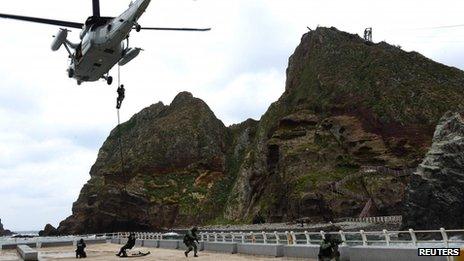South Korea President Park: 'No purpose' to Japan talks
- Published
President Park: "Dialogue is important but we must stick to our principles."
South Korea's president has highlighted a deep rift with Japan, as the region struggles to rein in North Korea's growing nuclear capability.
President Park Geun-hye told the BBC she saw no point in a summit with the Japanese leader unless the country apologised for war-time "wrongdoings".
Concern over regional security has grown in the past year, following North Korea's third nuclear test in February.
Ms Park said nations had to break the "vicious cycle" of Pyongyang's actions.
She said her country would take "firm and unremitting action" in response to any military provocation from North Korea.
The South Korean president was speaking to the BBC ahead of a visit to the UK, which begins this week.
'Coddling'
Park Geun-hye took office in February with a promise to revamp the Korean economy and enact a "trust-building" process with the North.
Her government reached an early agreement with Pyongyang to reopen a jointly-run industrial park at Kaesong, but further agreements - including a plan to reunite families separated by the Korean War - have not been honoured by the North.
And as signs of Pyongyang's commitment to its nuclear and missile programmes continue, there are calls from some countries to reopen talks.
In an interview before leaving for Europe, Ms Park said the familiar pattern of dealing with the leadership there must be broken:
"We cannot repeat the vicious cycle of the past where North Korea's nuclear threats and provocations were met with rewards and coddling, and then followed by renewed provocations and threats," she said.
"We must sever that vicious cycle… otherwise North Korea will continue to advance its nuclear capability and we will come to a point where this situation will be even harder to crack; where we won't be talking about whether North Korea should or should not possess nuclear weapons, but where… they will be calling for arms reductions, or arms talks."
Over the past three years, North Korea has carried out a nuclear test; launched a long-range rocket; restarted a nuclear reactor at Yongybyon; and shelled a South Korean island, killing four people, including civilians. It is also blamed by Seoul for sinking a South Korean warship with 46 sailors on board.
North Korea's actions have gradually brought its friends and enemies closer together. UN sanctions on Pyongyang were agreed this year by both China and the US, and Ms Park was greeted warmly and with fanfare when she visited Beijing in June.
"China is a very close neighbour" she said, "and we are currently carrying out various programmes to give greater substance to that partnership."
All of which makes South Korea's current relationship with Japan all the more striking. Eight months after taking office, Ms Park has still not met her neighbour and fellow US ally, and talk of a summit, she said, was still premature.

A territorial row has reignited historical differences with Japan
"The fact is there are certain issues that complicate [that relationship]" she said. "One example is the issue of the comfort women. These are women who have spent their blossoming years in hardship and suffering, and spent the rest of their life in ruins."
"And none of these cases have been resolved or addressed; the Japanese have not changed any of their positions with regard to this. If Japan continues to stick to the same historical perceptions and repeat its past comments, then what purpose would a summit serve? Perhaps it would be better not to have one."
Japan's war-time use of military sex slaves, or "comfort women", draws great public anger here, as does its claim over the rocky islet of Dokdo (known as Takeshima in Japan), which lies in the waters between the two nations.
Tokyo's new assertiveness on these kinds of issues is causing ripples with others in the region too, and with North Korea edging ever-closer to a deliverable nuclear weapons, regional co-operation - or lack of it - could carry real consequences.
- Published29 May 2013
- Published16 September 2013
- Published10 August 2012
- Published27 June 2013
- Published25 February 2013